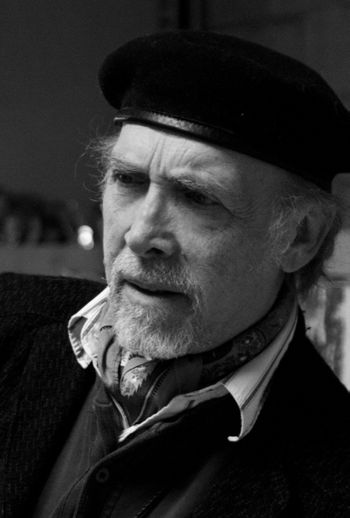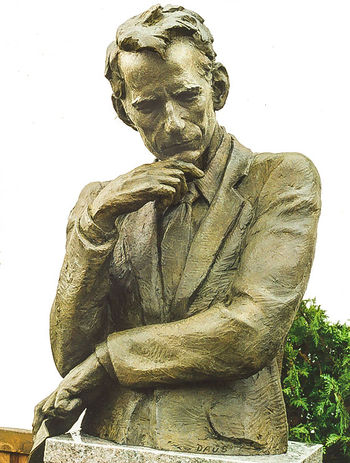Eugene Daub (sculptor)
Eugene Daub ((1942-?) is an American scultor known for statuary, busts in a classical style, and for medallic art (bas relief). Daub has studied at University of Pittsburgh, Pennsylvania Academy for the Fine Arts, and Alfred University in New York. He taught at the Pennsylvania Academy of the Fine Arts (PAFA) from 1987 to 1989. He created over forty major monuments in the U.S., and his sculptures can be found in the British Museum, the Smithsonian, at various universities, private industry,in some U.S. state capitals, and in the National Statuary Hall in the U.S. Capital building in Washington, D.C.
Daub has won both of the U.S. highest awards in medallic art, the Saltus Award from the American Numismatic Society, and the Gold medal from the American Numismatic Association. In 2002, he won the Arthur Ross Award for Fine Arts / Sculture from the Institute of Classical Architecture & Classical America (ICA)[1]. In addition to statuary work, he is an influential medallic scultor and is president and one of the pioneer member (since 1982) of the American Medallic Sculpture Association (AMSA) who pushed American contemporary medallic art into the international contemporary movement as reflected in the Fédération Internationale de la Médaille d'Art (International Art Medal Federation, a.k.a. FIDEM).
Some works
Daub has created many sculptures and bas relief for both private and public use. This article will highlight a few of them, including:
- The life-size sculture (from the waist up) of Claude Shannon which stands in a half dozen locations around the USA (at universities and corporations).
- The bas-relief "We Proceeded On" of the Lewis & Clark expedition, hanging centrally in the Montana senate chamber since 2005.
- The Lewis & Clark commemorative medallion
- The statue of Rosa Parks in the U. S. Capitol building's rotunda
Claude Shannon bust
Lewis & Clark scultures and medallions
In 2000, Daub's monument "Lewis & Clark and The Corps of Discovery" was unveiled in Kansas City by the American Bicentenniel Commission.
Daub's numismatic (relating to or consisting of coins, paper currency, and medals) opus notably includes the Lewis & Clark medallion highlighted in this article.
Rosa Parks statue in U. S. Capitol rotunda
Daub was the principle sculptor for the statue of Rosa Parks standing in the U.S. Capitol building rotunda; he collaborated with partner Rob Firmin on the concept and the pedestal for Rosa Parks.
Image gallery
These will be placed later
File:Bell Labs 2017 Murray Hill NJ.jpg One of at least six of Eugene Daub's sculpture of Claude Shannon. This one stands at entrance of Bell Labs in Murray Hill, NJ. |
|||
 This bronze bas relief by Eugene Daub is 96" x 204" and is called "We Proceeded On". It was installed in the Montana senate chamber in 2006. It depicts the 1805 expedition at the High Cliffs area east of Great Falls of the Columbia River. At the panel's center is Sacagawea, the Shoshone woman who acted as interpreter for the expedition. The sculpture was co-sponsored by the Montana Historical Society and the Lewis and Clark Bicentennial Commission. Mr. Daub was commissioned for the work after a nation-wide competition. |
|||
- ↑ The Arthur Ross Awards, 1982-2021, last access 4-5-2021



